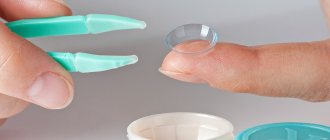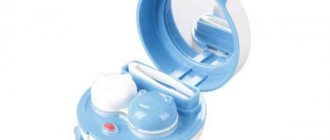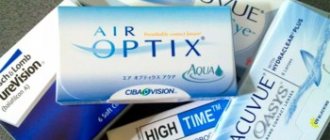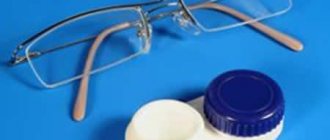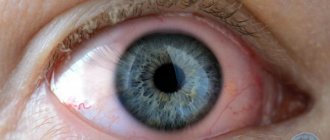Features of choosing liquid for contact lenses
Important! Ophthalmologists recommend paying attention not only to the composition of solutions, but also to their quality. Thus, when purchasing cheaper products, they cannot always meet the client’s expectations.
You can satisfy the buyer’s wishes by knowing some of the nuances of choice:
- The composition plays a big role when choosing liquid for contact lenses, but, as a rule, the most popular brands are chosen, such as Renu . Manufacturers create specific formulas for each type of solution, which, in turn, have a bactericidal and disinfectant effect. One of the main components will remain the chelating element and the buffer substance.
- You need to choose a solution for its intended purpose for every day or a universal one, which is more convenient. In terms of caring for daily products, you do not need much time, since they must be changed constantly.
- But multifunctional options must be placed in a special solution before going to bed, which will get rid of bacteria, germs, protein deposits, and dust .
- The label and description of the composition of the liquid should be studied in advance before purchasing, since, for example, peroxide products have very serious contraindications.
Attention! It is important to undergo a preliminary examination and, based on this, determine whether there are any allergic reactions. Only a specialist will be able to select a drug based on individual characteristics. It's quite difficult to do this yourself.
How often to change lens solution
Biotrue multifunctional lens solution is effective only if the liquid and special container are sterile. Each use of the product is accompanied by the elimination of bacteria, microbes, protein components and dust, so the already used liquid is no longer sterile and can become a source of harmful components.
Many people are convinced that lens solution needs to be changed every day. This rule only applies if you wear contact lenses all day long. How many times to change the lens solution is determined by each person independently; the main recommendation is to renew the supply of solution in the container after each removal of the scheduled replacement lenses. Owners of daily lenses will not need such accessories.
If you do not wear lenses, it is still advisable to change the solution. In case of irregular use of contact optics, it is recommended to clean the lenses at least once a week, wash the container and replenish the product supply. Otherwise, the liquid will evaporate and the lenses will dry out and lose their properties and shape.
How to properly store lenses?
It is especially important to know how to store products for those who use reusable options and, of course, what you can replace the contact lens solution with if you don’t have the original one on hand.
If the client will use the same pair of products for a long time, he should familiarize himself with the rules for storing liquids for them.
If the packaging of the vision correction device has not yet been unsealed, the shelf life may last as long as indicated in the corresponding column.
How to use and store products, and what to do if there is no solution for lenses:
- Purchasing a special container is a prerequisite for storing this kind of material.
- The liquid is used only once to clean the surface of the lenses; it is not recommended to do this again.
- It is better to regularly inspect the container with a magnifying glass for contamination.
- It is not recommended to mix the remains of the old solution and the new one; each time you should thoroughly rinse the container. If you have completely run out of the branded solution, you can make lens liquid at home (more on that below).
- Heat treatment of the container itself once a week is also necessary.
- The cleanliness of products that are removed from the solution is ensured by washing your hands well and using tweezers as a holder.
- Products should be completely immersed in the solution ; some manufacturers even have special marks for correct pouring of liquid.
To keep your vision at the desired level and prevent it from falling, you should follow these simple rules.
Important! As soon as any discomfort or burning is felt after using the lenses, they should be immediately removed, checked for cleanliness and subjected to additional processing.
Why can't you store lenses in water?
Improper disinfection and care of contact devices can lead to eye infections, eye damage, vision loss and even blindness. If you keep your lenses in water for several minutes or hours, bacteria, fungi and other pathogenic organisms can grow on the surface and then be transferred to your eyes. Therefore, the only correct solution is to use a special liquid for storage in containers. The ingredients of the solution ensure sterility, retention of shape and hydration so that you can use contact products without the risk of infection, discomfort and blurred vision.
How to replace lens solution?
Even if you don’t have a special solution for cleaning products at hand, there are substitutes that will do an excellent job of this role.
It is important that alternative methods are safe for the patient, do not cause a feeling of “mote in the eye” and are comfortable to use around the clock.
The most popular options for replacing lens solution:
- Saline solution is the most suitable substitute for lens fluid. This solution for lenses, at home, can replace a special liquid for some time. The container in which the products are placed must be disinfected; you can even boil it first and only then pour in the saline solution. You can store lenses in this product, periodically replacing it with a new one. The container can only be closed when the products are completely under saline solution.
- Some eye drops (such as Visine: Clear Tear) are also used as lens fluid , as they prevent the surface from drying out. The composition includes special components that allow the solution to be disinfected and do not pose a threat to humans.
Extended Wear Contact Lenses
Extended-wear contact lenses can be left in place at night until the expiration date specified by your ophthalmologist. Some extended wear lenses are recommended to be thrown away after removal, while others can be worn again after cleaning and disinfecting them.
It is important to strictly follow the wearing regimen recommended by the ophthalmologist. Did you know that wearing someone else's or borrowing your own contact lenses is not safe for the health of your eyes? Contact lenses are selected strictly according to the individual characteristics of the patient's eyes, so it is unacceptable to allow others to wear your lenses.
How to make lens solution at home?
With the correct combination of water and salt, you can make a solution for lenses with your own hands , which fights bacteria, deposits, and dust.
To do this you will need: a container (that can be tightly closed), salt, clean water and a device to heat the water.
To prepare a composition to replace contact lens solution, you will need to take the following steps:
- Thoroughly wash and boil the container in which you will store the products;
- Boil 1000 ml of clean water (filtered or store-bought artesian water);
- Gradually dissolve 9 grams of salt in boiling water;
- Cool the resulting solution, pour it into a container prepared for storing lenses, and also rinse the lenses with this solution before final immersion for storage;
- In the morning, the lenses must be placed in this solution and kept there for 2-3 hours.
Important! Monitor the condition of your eyes when putting on lenses after such a self-prepared saline solution. If you experience even the slightest dryness or discomfort in your eyes, remove the products immediately.
The Difference: Hydrogen Peroxide and Multi-Purpose Solutions
Although hydrogen peroxide and multi-purpose solutions perform the same functions (debris removal lenses, extensions, etc.), there are several significant differences between them.
Both products are capable of breaking down protein and lipid bonds to remove trapped debris, but hydrogen peroxide contact lens solutions are able to penetrate microbial biofilms, something most multipurpose solutions cannot do. Some multi-purpose solutions can do this task, but most cannot.
For some people, the extra neutralizing step is a downside to a one-step, multi-purpose solution. But hydrogen peroxide contains no preservatives, making it effective and safe for virtually all contact lens wearers, especially those who have allergies or are sensitive to the preservatives found in multipurpose solutions.
Additionally, hydrogen peroxide is much more effective at treating acatemoebe keratitis (an eye infection that can cause blindness) than all other types of contact lens solutions.
Always consult your eye care provider before deciding on the best way to clean and disinfect your lenses. Never change your lens care regimen before contacting your eye care provider.
Liquids unsuitable for storage
- Ordinary water is not suitable for liquids where to put lenses if there is no solution , since it already contains a large number of bacteria, which, in turn, can lead to the formation of mold. This also includes boiled and distilled water.
- It is strictly forbidden to wipe the surface of the lens with saliva, for the same reason as with water.
- If you completely refuse to use liquid, this will lead to drying out of the surface and damage not only to the material, but also to vision..
Attention! It is recommended to use substitutes only in extreme cases, for example, if there is no liquid for lenses, and it is not yet possible to buy a new one.
Temporary replacement
Clean glass or porcelain containers are suitable as a temporary alternative. There should be two of them: for the left and right lenses. The bottom and walls need to be smooth and not damaged when taken out.
Sterilize containers by boiling, or in extreme cases, pour boiling water over them a couple of times.
Then pour a special solution into each and place the lenses there, then cover with a sheet of paper or a lid to protect the lenses from dust. Don't forget to write on paper where the left lens is and where the right one is.
If there is no solution to pour into the container, use sterile saline solution (sodium chloride 0.9%), but only as a temporary measure. This composition will help preserve the lenses, but will not remove dirt. After this, you will have to keep the lenses in the liquid intended for cleaning them for several hours before putting them on your eyes.
Let's figure out where to put the lenses if there is no container.
Suitable:
- glasses;
- cups;
- glass baby food jars with screw caps.
A good replacement for a lens container would be plastic test collection jars. They are pre-sterilized and equipped with screw caps. If your lenses came in glass bottles and you still have them, you can use those too.
If you just opened a fresh package of lenses in the morning (and they are stored there in solution) and did not throw out the blisters, you can, as a last resort, put the lenses there.
The main thing is that the container in which you are going to put the lenses is clean and has a smooth inner surface.
Sometimes on the Internet you can find advice that can only be called harmful, for example, “you can wet the lenses with saliva and put them in a plastic bag.” Saliva is not a sterile liquid. It contains many pathogenic microorganisms, which, if they get into the eye along with a soft contact lens, can cause inflammation of the cornea.
If the model of your lenses provides for prolonged wearing and your eye health allows it, but there is no suitable container and liquid, it is better not to remove the lenses for one night. In the morning, go to the pharmacy and buy everything you need. Or remove the lenses and throw them away. It's better to lose a pair of lenses than to lose your vision. In other words: you can buy new lenses, but you can’t buy new eyes.

